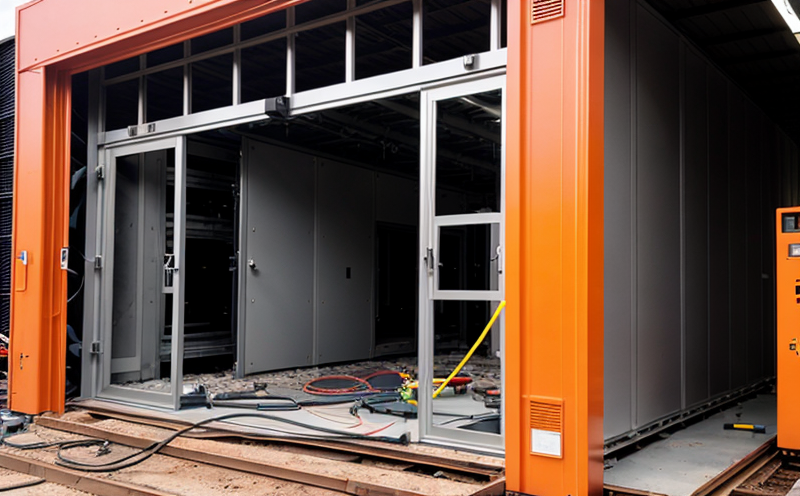UL 2580 Thermal Management and Safety Testing of EV Battery Systems
The UL 2580 standard is a pivotal requirement for manufacturers of electric vehicle (EV) battery systems. This standard mandates comprehensive testing to ensure the safety, durability, and reliability of these critical components in vehicles. The primary goal of this testing is to prevent thermal runaway events that could lead to fires or explosions.
The UL 2580 standard covers a wide range of tests including internal short circuit (ISC), overcharge, high temperature, low temperature, mechanical abuse, and forced air cooling. Compliance with these tests ensures that the battery system can withstand real-world conditions without compromising safety. This is critical given the increasing demand for electric vehicles which are expected to reach 20 million units by 2025.
The UL 2580 standard has been developed based on extensive research and analysis of thermal management challenges in EV batteries. It aims to provide a robust framework that can be adapted to various battery chemistries, such as lithium-ion, while ensuring consistent safety standards across all models. Compliance with this standard is mandatory for manufacturers seeking to sell their products in North America.
The testing process involves rigorous simulations of real-world scenarios where the battery may face extreme conditions. For instance, an internal short circuit test simulates a worst-case scenario where a high current flows through a fault within the battery. This tests the system’s ability to contain and control such faults without causing catastrophic failures.
Another critical aspect is the overcharge test which ensures that the battery can handle prolonged exposure to higher than normal charging voltages safely. High temperature testing simulates conditions where the vehicle may be parked in a hot environment, ensuring the battery remains stable under these conditions. Conversely, low temperature tests simulate cold environments, verifying that the battery functions correctly even when temperatures drop significantly.
Forced air cooling and mechanical abuse tests further enhance the robustness of the battery by subjecting it to high-velocity airflow and physical stresses such as drops or impacts. These tests are designed to replicate accidental situations that could occur during normal use, ensuring the battery remains safe under all circumstances.
The comprehensive nature of UL 2580 testing ensures that manufacturers have a reliable roadmap for developing safe and efficient EV battery systems. By adhering to this standard, companies not only meet regulatory requirements but also enhance their reputation as leaders in safety and innovation within the automotive industry.
Our laboratory offers state-of-the-art facilities equipped with advanced instrumentation capable of performing all required UL 2580 tests accurately and efficiently. Our team of experts ensures that every test is conducted precisely according to standard protocols, guaranteeing reliable results. We provide detailed reports summarizing the outcomes of each test, highlighting any areas requiring improvement along with recommendations for enhancement.
By choosing our services, you invest in the future safety and longevity of your EV battery systems. Compliance with UL 2580 not only enhances product quality but also opens up lucrative market opportunities by enabling access to major North American markets.
Scope and Methodology
The scope of UL 2580 testing encompasses the following key areas:
- Internal Short Circuit (ISC)
- Overcharge
- High Temperature Exposure
- Low Temperature Exposure
- Mechanical Abuse
- Forced Air Cooling
The methodology involves setting up controlled environments to simulate real-world conditions where the battery may encounter stress. For example, in the overcharge test, batteries are subjected to voltages higher than their nominal ratings for extended periods. In high temperature tests, they are exposed to temperatures exceeding 50°C (122°F). Low temperature tests use freezing chambers capable of reaching -40°C (-40°F).
For mechanical abuse testing, batteries undergo simulated impacts using drop towers or compression machines. Forced air cooling tests involve placing the battery in a chamber with fans blowing at high speeds to simulate conditions inside an operating vehicle.
Each test is carefully documented, and results are analyzed against accepted criteria specified by UL 2580. Compliance requires that all tests meet stringent standards without any failures or unacceptable degradation of performance.
Benefits
- Mandated compliance with regulatory requirements ensuring safe operation in North America.
- Enhanced reputation as a leader in safety and innovation within the automotive industry.
- Achievement of stringent quality standards leading to superior product performance.
- Increase in market access by enabling entry into major North American markets.
- Reduction in potential liabilities associated with non-compliance and accidents due to safety issues.
- Improvement in customer trust and satisfaction through the assurance of safe products.
The benefits extend beyond regulatory compliance into broader business advantages. Safe and reliable EV battery systems contribute significantly to reducing environmental impacts by promoting sustainable transportation solutions. By ensuring high quality standards, manufacturers can differentiate themselves from competitors, gaining a competitive edge in an increasingly competitive market.





